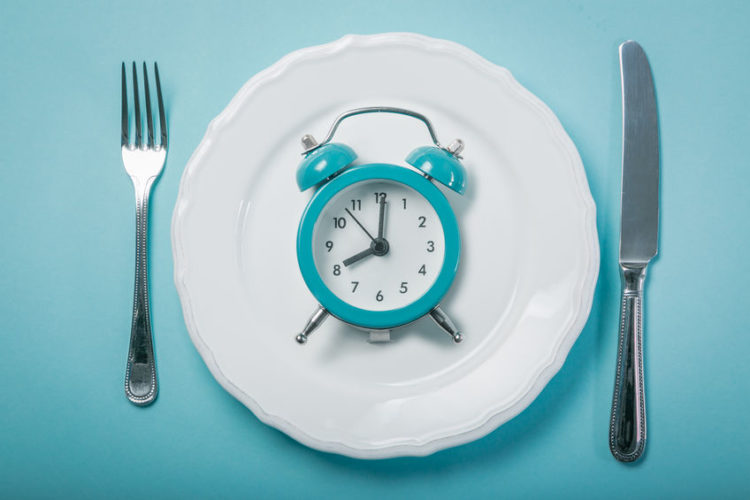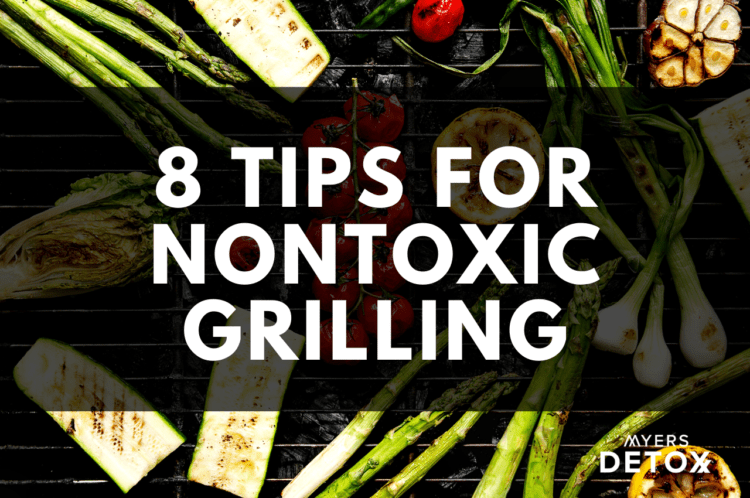Top 5 Benefits of Intermittent Fasting

Did the word fasting throw you into a panic? No need to fear. I’m talking about intermittent fasting – fasting for a short period of time. Our bodies were designed to fast. Cavemen were forced to fast when food was not readily available.
It’s incredibly healthy for our bodies to fast on occasion, or go without food for short periods of time. We would be wise to emulate this healthy practice of our ancestral cavemen.
One of the easiest health strategies you can employ is to concentrate food intake during an 8-hour window during the day, preferably during daylight hours. This means you’re doing “intermittent fasting” for 16 hours the rest of the day.
Typical fasting time ranges from 14 to 18 hours during a 24 hour period. I simply delay eating. I skip breakfast and eat lunch and dinner within a six to eight-hour time frame, and stop eating three hours before I go to bed. Play around and find what works for you and your body.
In this article I review the top 5 benefits of intermittent fasting. I suggest trying it to see how it feels!
The Top Benefits of Intermittent Fasting
There are lots of benefits to intermittent fasting. These are the top ones:
- Improved sleep
- Weight loss and fat burning
- Increased insulin sensitivity – a key to fat loss
- Controlled ghrelin – the hormone the tells us we’re hungry
- Boost HGH (human growth hormone) by more than 1000%!
- Improves detox ability and fights free radical damage
- Autophagy (aka body clean up!)
- Improved immunity (if 24 hours or less)
- Helps suppress inflammation
Read below about how integrating intermittent fasting into our modern lifestyle can help manage weight, aid in more restful sleep, even help our hormone regulation. I will be going into detail on the top 5 of these benefits below…
Improved Sleep
By fasting we improve our circadian rhythms. Circadian rhythms have powerful influences on many biological processes. Disrupted circadian rhythms are a common feature of disease.
The circadian clock is strongly influenced by diet. Indeed, food intake dominates light in setting the circadian clock. When you eat only during daylight hours it sets your internal clock so you sleep better at night.
People who eat at night tend to be night owls simply because it throws off their circadian rhythms – their internal clock (1). At the very least, eat several hours prior to bedtime.
As I wrote in The Ultimate Guide for Sleep you should never eat within the three hours before you go to bed! It causes a dysregulation of your circadian rhythm with your two master hormones, ghrelin and leptin, that control your metabolism and hunger cues the following day.
Weight Loss and Fat Burning
Intermittent fasting has major weight loss and fat burning benefits and should be a part of any weight loss strategy. Doing a short, 16-hour fast, every day improves your hormones – it lowers blood sugar and insulin levels. This is important to note because insulin is the hormone that tells your body to store fat.
Fasting also regulates ghrelin – the hunger hormone. Ghrelin is the hormone that instructs us to eat. Proper regulation of this hormone will reduce hunger. When I wake up in the morning, I am amazed how I never feel hungry until 10am or so (sometimes even 2pm), even though I last ate at 4 or 5 pm the previous day! Why? My body is burning fat for fuel.
One of the primary mechanisms that makes intermittent fasting so beneficial for health is related to its impact on your insulin sensitivity.
While sugar is a source of energy for your body, it also promotes insulin resistance when consumed in the amounts found in our modern processed junk food diets. Insulin resistance, in turn, is a primary driver of chronic disease—from heart disease to cancer.
Intermittent fasting helps reset your body to use fat as its primary fuel. Research confirms that when your body becomes adapted to burning fat instead of sugar as its primary fuel, you dramatically reduce your risk of chronic and inflammatory disease.
Fasting will help your body adjust from burning carbs to burning fat. Eating on a six- to eight-hour window can take a few weeks and should be done gradually. Once your body has successfully shifted into fat burning mode, it will be easier for you to fast for as much as 18 hours and not feel hungry.
If you’re conditioned to eat all day long, your body will be crying out for food for a few days until you move into a better regulation of blood sugar and hormone control. Intermittent fasting takes a little getting used to. But it’s worth the effort.
A ‘fast’ of this nature kicks your body into fat burning mode. When you’re not eating, you’re burning FAT. It’s a win-win for your waistline and your health!
Increases Growth Hormone
Human growth hormone (HGH) lowers as we age. It begins to reduce in our thirties. It’s role in the body helps to build muscle and burn fat. It’s maximization is key in fitness and slowing the aging process.
Research has shown fasting can raise human growth hormone by as much as 1,300 percent in women, and 2,000 percent in men (2).
HGH is also a fat-burning hormone. When you fast and increase HGH, it can be very effective for weight loss.
Detox and Intermittent Fasting
Detox is one of the best side effects of intermittent fasting.
Digestion uses up a ton of our energy. When the body is allowed to take a short break from eating, the extra energy is used for repair and detox. The liver gets to work. The biggest benefits of fasting seem to begin as soon as the liver runs out of fuel, which happens in 16 hours.
Detox is a very energy intensive process. Intermittent fasting and eating less often give the body a chance to facilitate detox. If you eat a big meal late a night before you go to bed, your liver is dealing with that, not getting to the toxins.
Fasting decreases the accumulation of oxidative radicals in the cells, and thereby prevents oxidative damage to cellular proteins, lipids, and nucleic acids associated with aging and disease. This is why you’re detoxing – to optimize removal of metals and toxins that produce damaging free radicals. Fasting helps to reduce the damage they are causing.
Autophagy and Body Clean Up
Autophagy is the process by which your body “cleans” itself. Any malfunctioning or old cells are purged & reabsorbed into our systems. Bacteria and viruses are also cleaned up (3). Autophagy peaks after 16 hours of not eating. When we’re digesting food, autophagy is turned off.
Intermittent Fasting Is Not for Everyone
It’s fun to experiment with diets, trends and biohacks, but always pay close attention to your body and your energy levels. Individuals who are hypoglycemic, diabetic, have adrenal fatigue, cortisol dysregulation or are pregnant and/or breastfeeding should approach intermittent fasting with caution.
Fasting for One Day or More
I’m not a fan of fasting for more than a day or two. I believe longer fasts are depleting to the body in a time when most people are very depleted of nutrients, namely minerals.
Cavemen ate a diet vastly more nutrient dense than we do today. We cannot nutritionally afford to go too long without food for this reason. Learn more about this issue in my article Why you Desperately Need to Supplement Minerals.
Fasts longer than 48 hours show no increased benefits. After 24 hours of fasting, cells become depleted of proteins, which impairs cellular function (4).
Additionally, studies show that fasts under 24 hours increase immunity, but longer fasts depress immunity (5).
Intermittent fasting (16 hours) gives you all the benefits of fasting while minimizing depletion since you’re eating every day.
Fasting is also great to reduce inflammation. So if you’re in pain or have an inflammatory disease, fasting can really help calm the inflammation and reduce symptoms.
But why starve yourself for 3 days if it’s not increasing benefits to you?
Start with intermittent fasting and see how you do.
What did you think of this article? Do you plan on giving intermittent fasting a shot? Let me know in the comments below!
Click Here for References+
4. Mishuzima, N. et. al., In vivo analysis of autophagy in response to nutrient starvation using transgenic mice expressing a fluorescent autophagosome marker. Molecular Biology of the Cell 15, no. 3. March 2004: 1101-11. http://pmid.us/14699058









